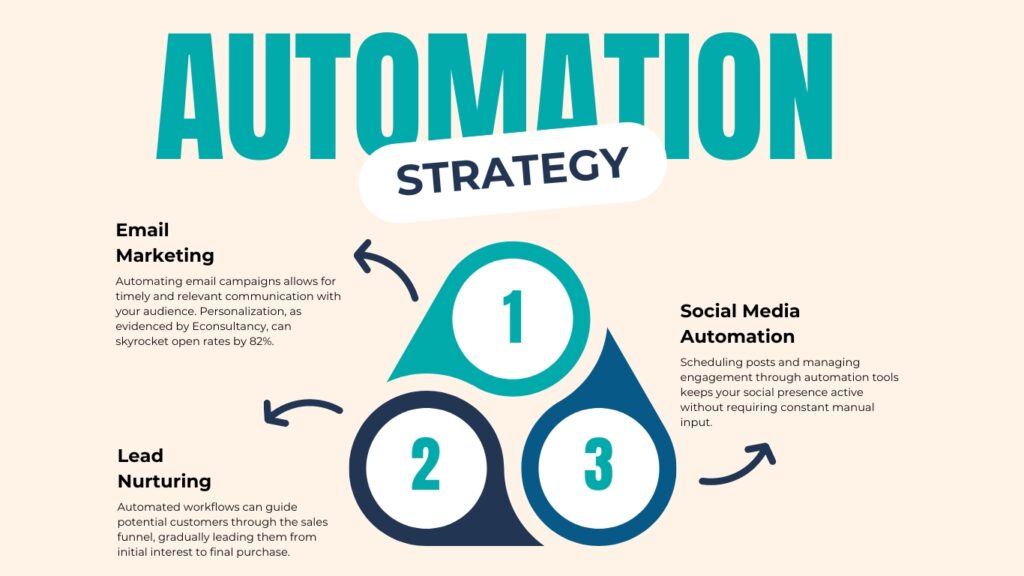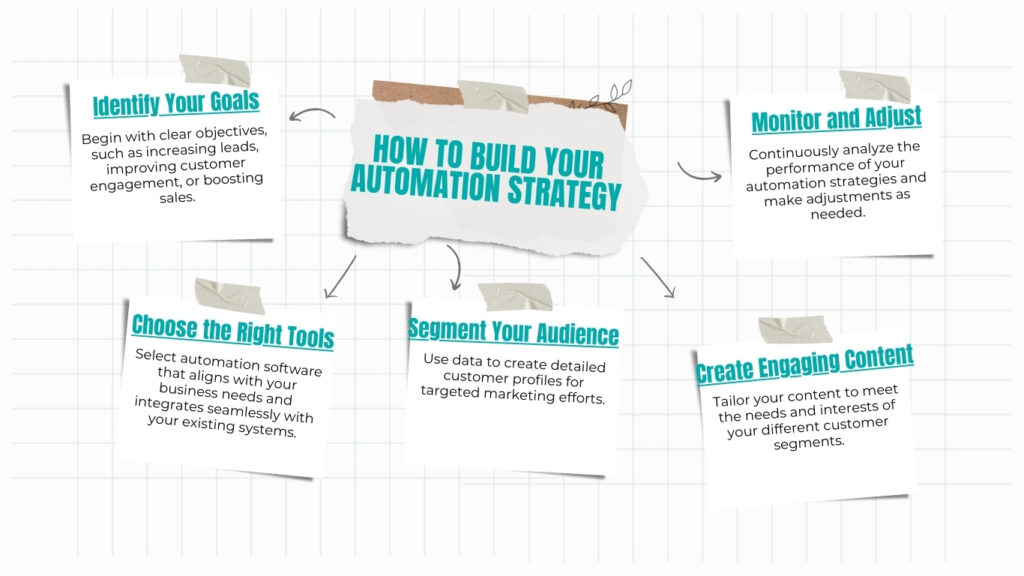Marketing automation stands out as a lifeline for small businesses and startups eager to carve their niche online. It goes beyond merely chasing trends. It’s about setting up a foundation for growth that’s scalable and efficient, crafting a pathway for genuine connection with your audience. Through this guide, we’ll explore the critical importance of marketing automation, highlighting its benefits while also acknowledging the pitfalls of not adopting it. We’ll walk you through how to implement a game-changing strategy that propels your business forward, ensuring you stay ahead in a world where human touch and automation intersect. Without embracing marketing automation, businesses risk falling behind, unable to compete in the fast-paced digital marketplace.
Introduction to Marketing Automation
Marketing automation refers to the use of software and technology to automate marketing tasks and processes. This includes everything from email marketing and social media campaigns to lead nurturing and analytics. For small businesses and startups, marketing automation is not a luxury—it’s a necessity. It levels the playing field, allowing smaller entities to execute marketing strategies that rival those of much larger companies.
The Benefits of Marketing Automation
The adoption of marketing automation technology offers a wide range of benefits that can significantly transform how businesses approach their marketing strategies. At its core, marketing automation saves invaluable time by handling repetitive tasks that would otherwise consume hours of work, thereby dramatically increasing operational efficiency and productivity. This automation extends beyond mere time-saving; it revolutionizes the way businesses can segment and target specific customer groups. Through sophisticated algorithms and data analysis, companies can now deliver highly personalized marketing messages tailored to the unique preferences and behaviors of different customer segments, leading to more effective and impactful marketing campaigns.
A compelling statistic from The Annuitas Group underscores the remarkable potential of marketing automation: small businesses that use these systems to nurture their prospects experience an astounding 451% increase in qualified leads. This surge in leads is not just a number; it represents a significant opportunity for businesses to engage with more potential customers in a meaningful way, thereby expanding their customer base and increasing sales potential.
Moreover, the efficiency garnered through marketing automation has a direct and positive impact on Return on Investment (ROI). By automating routine tasks, businesses can allocate their resources and staff to more strategic initiatives that contribute to growth and profitability. Furthermore, the personalized and timely nature of automated marketing efforts dramatically improves the overall customer experience. Customers today expect relevance and personalization in their interactions with brands, and marketing automation tools are pivotal in meeting these expectations.
Key Elements of a Successful Automation Strategy
A well-rounded marketing automation strategy involves several key components:

- Email Marketing: Automating email campaigns allows for timely and relevant communication with your audience. Personalization, as evidenced by Econsultancy, can skyrocket open rates by 82%.
- Social Media Automation: Scheduling posts and managing engagement through automation tools keeps your social presence active without requiring constant manual input.
- Lead Nurturing: Automated workflows can guide potential customers through the sales funnel, gradually leading them from initial interest to final purchase.
How to Build Your Automation Strategy
Developing an effective marketing automation strategy involves several critical steps:

- Identify Your Goals: Begin with clear objectives, such as increasing leads, improving customer engagement, or boosting sales.
- Choose the Right Tools: Select automation software that aligns with your business needs and integrates seamlessly with your existing systems.
- Segment Your Audience: Use data to create detailed customer profiles for targeted marketing efforts.
- Create Engaging Content: Tailor your content to meet the needs and interests of your different customer segments.
- Monitor and Adjust: Continuously analyze the performance of your automation strategies and make adjustments as needed.
Challenges and Considerations
Despite its benefits, marketing automation implementation is not without its obstacles. These can range from choosing the appropriate automation tools to ensuring data quality and dealing with the learning curve of new software. However, by focusing on strategic planning and continuous learning, these challenges can be effectively navigated.
Future Trends in Marketing Automation
The landscape of marketing automation is rapidly evolving, with trends pointing towards more advanced AI capabilities, improved personalization techniques, and greater emphasis on customer experience. Staying abreast of these advancements will be crucial for businesses looking to maintain a competitive edge.
Conclusion
In the realm of small business marketing, automation is no longer optional, it’s imperative for survival and success. By harnessing the power of marketing automation, businesses can achieve unparalleled efficiency, foster meaningful connections with customers, and see substantial growth in revenue. Remember, though the global marketing automation software market is set to reach $8.6 billion by 2025, the sooner you adopt these strategies, the quicker you’ll reap their rewards. The time to start your marketing automation journey is now.
Take inspiration from this guide and begin charting your course toward a more automated, successful future for your business. Through strategic planning and implementation, your enterprise can not only survive but thrive in the digital age.
By the way, At The Ant Firm, we understand the challenges businesses face in establishing a commanding online presence. An outdated website fails to accurately represent your brand, while social media profiles lie dormant, missing valuable engagement opportunities. In Toronto’s thriving market, an ineffective digital footprint can severely hamper growth potential.
As an emerging web design and marketing agency, our mission is to provide businesses like yours with affordable, high-caliber online marketing solutions. Our team is passionate about propelling your brand’s digital presence from underperforming to a powerhouse that attracts your target audience.
Our comprehensive services include visually impressive and user-friendly website designs that capture interest, coupled with strategic social media campaigns that cultivate meaningful connections with your customers. We devise customized online marketing plans tailored specifically to your goals and industry.
Unlike larger agencies, The Ant Firm prides itself on offering accessible expertise without excessive costs. We prioritize efficient execution and seamless communication throughout our partnership. Need Web design Toronto? Want a Marketing agency Toronto? We do both. Simple websites. Effective





